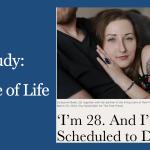
Image via Pixabay
It’s not what you may have heard. Death Site News is promoting the words of Fr. Mark Goring; he says that “The blood of these unborn children is on your hands if you vote for and support an aggressively pro-abortion politician.”
This is false. The Church nowhere teaches that a person who votes for a pro-choice Democrat incurs the guilt of abortion.
Now, in 2004, the CDF—with Cardinal Joseph Ratzinger as its prefect—put out a document entitled “Worthiness to Receive Holy Communion: General Principles.” In this document, the CDF says that Catholics may not:
- Propagandize in favor of abortion
- Support laws permitting abortion
In terms of voting for political candidates, the CDF says this:
A Catholic would be guilty of formal cooperation in evil, and so unworthy to present himself for Holy Communion, if he were to deliberately vote for a candidate precisely because of the candidate’s permissive stand on abortion and/or euthanasia. When a Catholic does not share a candidate’s stand in favour of abortion and/or euthanasia, but votes for that candidate for other reasons, it is considered remote material cooperation, which can be permitted in the presence of proportionate reasons.
Nowhere does the CDF tells us what those “proportionate reasons” are. This means that the Church leaves it to the individual’s own prudential judgment; the Church leaves it to the individual’s own conscience before God.
Suppose, for example, that a person were to believe that a candidate’s policies would result in fewer women deciding to have an abortion than the opponent’s policies (irrespective of the legality of abortion). That might count as a “proportionate reason.”
Or suppose a person were to believe that an opposing candidate—the Republican, let us say—would not change anything relative to abortion. The issue cancels itself out and the voter makes a decision on the basis of issues apart from abortion.
Or suppose a person were to believe that the Trump administration and the Republican party presents a present danger proportionate to the evil of abortion. Suppose he or she votes for a Democrat candidate to mitigate that danger. That would also count as a “proportionate reason.”
A voter might very well be wrong in these personal judgments. But that does not of itself mean that they vote Democrat to advance pro-abortion policies; still less does it mean that they incur the guilt of abortion and have “blood on their hands.”
The USCCB, in Forming Consciences for Faithful Citizenship,” addresses another contingency in voting:
When all candidates hold a position that promotes an intrinsically evil act, the conscientious voter faces a dilemma. The voter may decide to take the extraordinary step of not voting for any candidate or, after careful deliberation, may decide to vote for the candidate deemed less likely to advance such a morally flawed position and more likely to pursue other authentic human goods.
The Church leaves it to the voter’s own conscience and discernment when such a situation exists, and which candidate is “less likely to advance” moral evil and “pursue other authentic human goods.”
It may be, in one’s conscience, that it is the Democrat who will pursue those “goods.”
Don’t give in to the moral bullying that takes place every election year, that sinfully attempts to manipulate your conscience and your vote by raising the spectre of “blood on your hands” unless you vote Republican. Don’t believe it. This is not Catholic teaching.















